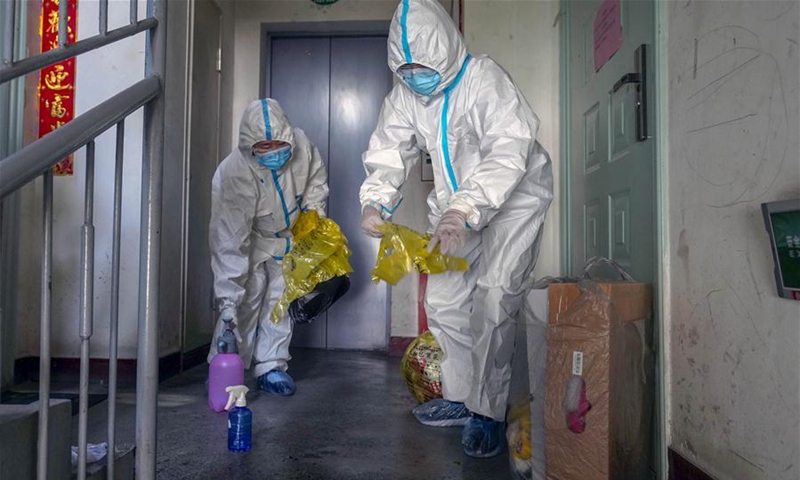Repeated nucleic acid tests on Urumqi residents to single out high-proportion silent carriers
By Liu Caiyu Source: Global Times Published: 2020/8/12 19:18:40

Qiu Tingting (R) collects garbage of the residents in quarantine at Renminlunan Community, Tianshan District of Urumqi, northwest China's Xinjiang Uygur Autonomous Region, Aug. 6, 2020. Qiu Tingting, 33, the secretary of the Renminlunan Community branch of the Communist Party of China, has been working tirelessly in the community during the COVID-19 epidemic. Residents in this community regard Qiu and her colleagues as "community servants at the frontline of epidemic prevention and control" for their careful and thoughtful work. (Xinhua/Zhao Ge)
Urumqi, capital city of Northwest China's Xinjiang Uygur Autonomous Region, re-mains on high alert against COVID-19 and is giving repeated nucleic acid tests to people at high risk of infection, although the number of cases in the city is showing a downward trend.
On Tuesday, the city reported nine confirmed patients, the first time the daily number had fallen to single digit in the latest outbreak.
It has been 28 days since July 17, when Urumqi decided to lock down communities and ordered residents to stay indoors, and the city has shown no signs of easing re-strictions. Hardly anyone can be seen on the streets except sanitation workers, police and security guards in front of communities, according to locals in Urumqi reached by the Global Times on Wednesday.
The Xinjiang health authority reported on Wednesday that Urumqi logged nine con-firmed cases and eight asymptomatic infections on Tuesday, the lowest daily number of confirmed infections since the clustered outbreak in early July.
As of Tuesday, Urumqi had reported 531 confirmed cases. The current number of asymptomatic infections stands at 131, and 14,569 people are under quarantine.
Citywide free nucleic acid tests of all 3.5 million residents have been completed, but Urumqi is giving repeated tests to key populations and communities where confirmed patients have been detected, Zhang Yuexin, a medical expert who is part of the Xin-jiang anti-epidemic group and a professor of the infectious disease department of the First Affiliated Hospital of Xinjiang Medical University, told the Global Times on Wednesday.
Residents in many key communities in Urumqi, such as those in Tianshan district and Sayibak district that are close to the clustered outbreak, were given at least five rounds of nucleic acid tests, the Global Times learned from locals.
Li Pengxin, the anti-epidemic group leader in Xinjiang, earlier said that Urumqi com-pleted two rounds of citywide testing last week. People in key communities, quaran-tine hotels and venues were tested three or four times. "By testing residents every five days, we could identify as many patients as possible," said Li.
Zhang said the reason for the repeated tests is to find infected patients and patients who have no symptoms or those who are still in the incubation period.
"Repeated tests will ensure no one goes undetected. People carrying very low loads of the virus can be found through repeated tests," Zhang noted, "The novel corona-virus is cunning."
In Wuhan, the Chinese city hit hardest by the COVID-19, at least one-half to two-thirds of confirmed patients had shown symptoms of fever, cough, muscular soreness and fatigue, but almost half of the confirmed patients in Urumqi had no symptoms at all, with only one-fifth of them having a fever and a few feeling fatigue, Qiu Haibo, deputy president of Zhongda Hospital at Southeast University in Nanjing, East Chi-na's Jiangsu Province, told media on Tuesday.
Qiu said those patients in Urumqi show very atypical symptoms, which is also re-flected in their Computer Tomography images. The number of silent virus carriers found in the early stages in Urumqi may be higher than any other city in China.
Experts attributed the high number of silent carriers to early detections and the young age of infected population. "Many patients were found before they even showed any symptoms and the majority of the infected patients in Urumqi are young people whose immunity are stronger," Zhang said.
Wuhan-based virologist Yang Zhanqiu said this could also be a result of weak viru-lence in this wave of clustered infections in Urumqi.
Posted in: SOCIETY,CHINA FOCUS